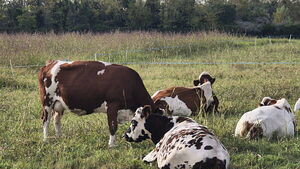EU on brink of opening doors to potentially dangerous beef imports, says Irish MEP

Ottoline Spearman
Irish MEP Cynthia Ní Mhurchú has expressed shock following the publication of an Irish Farmers’ Journal exposé on Brazilian beef production.
The report highlighted the illegal sale of antibiotics, improper recording of animal medicines used and purchased, animal traceability issues, and feeding of growth promoters in Brazil’s beef industry.
Ms Ní Mhurchú cautioned that Europe is on the cusp of agreeing a deal that could see second-rate, unsafe beef enter the EU food chain.
The Ireland South MEP said the findings highlight a “shocking willingness” by the European Commission to overlook poor agricultural practices in Mercosur countries in its rush to finalise a trade agreement.
The Irish Farmers Journal investigation uncovered widespread, uncontrolled access to powerful veterinary antibiotics in Brazil, alongside weak traceability and oversight systems — practices that would be illegal across the EU.
Prescription-only antibiotics were freely available over the counter in Brazilian agricultural supply stores, without any prescription, herd number, or animal identification.
The investigation also found no barcodes or systematic tracking for these medicines, raising serious doubts about Brazil’s capacity to ensure antibiotic use complies with the standards expected in exports to the EU.
She said the findings call into question the very basis on which the EU-Mercosur trade deal is being advanced.
Ms Ní Mhurchú said: “That such powerful antibiotics can be bought so casually in Brazil without any regulatory checks is not just a problem for animal health — it is a public health red flag and one that should make everyone in Europe stop and think.
"As we push forward with the Mercosur trade deal, European farmers and EU citizens simply cannot be expected to compete on a playing field where such practices go unchecked.”
Ní Mhurchú wrote to the European Commission on Thursday morning, asking them to publicly explain what rigorous due diligence was carried out before advancing this trade deal.
She warned that without a clear, transparent, and robust response from the European Commission, the Mercosur deal risks legitimising a two-tier system — one for EU producers held to high standards, and another for cheaper meat imports from third countries operating under far laxer controls.




